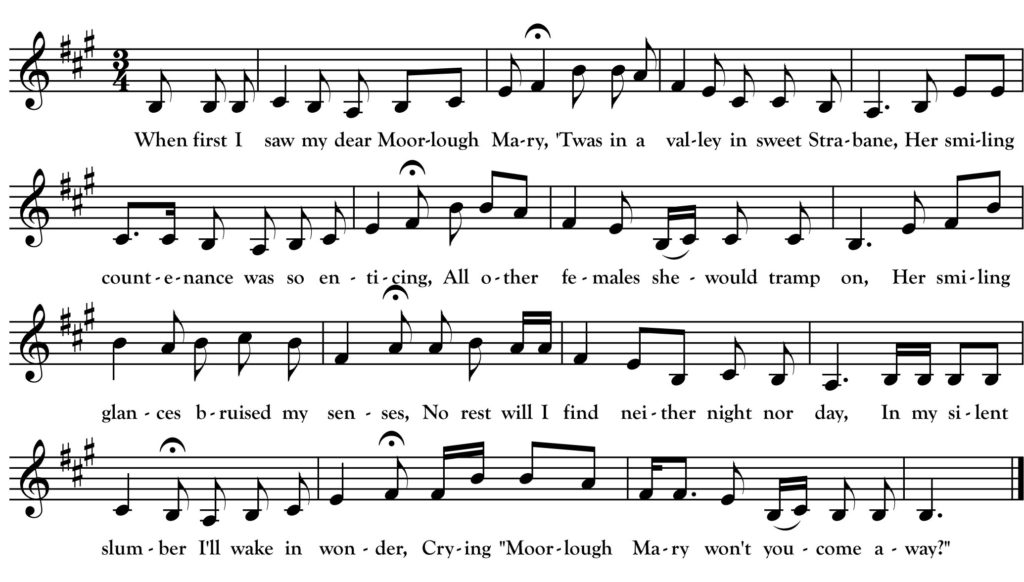Moorlough Mary

When first I saw my dear Moorlough Mary,
’Twas in a valley in sweet Strabane,
Her smiling countenance was so enticing,
All other females she would tramp on,
Her smiling glances bruised my senses,
No rest will I find neither night nor day,
In my silent slumber, I’ll wake in wonder,
Crying “Moorlough Mary, won’t you come away?”
Was I a man of good education,
Or Erin’s Isle all at my command,
I’d lay my head on your seething bosom,
In bands of wedlock, you’d join my hand,
I’d entertain you both morning and evening,
In robes I’d dress both neat and gay,
With kisses sweet, love, I would embrace you,
Kind Moorlough Mary, won’t you come away?
I’ll away, I’ll away to some lonely valley,
Where recreation is in full bloom,
Where the rivers mourning and salmon sporting,
Each sound and echo brings something new,
Where the thrush and blackbird is joined in chorus,
The notes melodious on each stream bound,
I would sit and sing ’til my heart’s contented,
Dear Moorlough Mary, if you was with me now.
I’ll press my cheese while my mules* are teased,
I’ll milk my ewes by the eve of day,
I’ll sit and sleep ‘til my heart’s contented,
Crying “Moorlough Mary, won’t you come away?”
*most Irish versions refer to the teasing of “wools” here
This month we have a north woods version of the well-loved Irish song “Moorlough Mary” that some may know from the singing of Paddy Tunney, Cathal McConnell, Kevin Mitchell or other singers from the north of Ireland. A version from Co. Tyrone appears in Sam Henry’s Songs of the People with the note that it was composed by Tyrone man James Devine around 1876. If Devine wrote it, it must have gained popularity quickly as it appears in the Bodleian Library’s broadside archive on a London-printed song sheet from before 1885.
New England song collector Helen Hartness Flanders collected two versions in northeastern Maine. Both field recordings are available online via the Helen Hartness Flanders Ballad Collection on archive.org. The above melody is my transcription of what Charles Finnemore of Bridgewater, ME sang for Flanders in 1941. Finnemore’s text was only a fragment so I transcribed the text based on Flanders’ 1942 recording of Jack McNally or Staceyville, ME. Both singers have wonderful traditional styles. McNally’s singing is more full-throated and intense where Finnemore is light and lilty. They are both great examples of Irish style singing transplanted to the North American woods.
